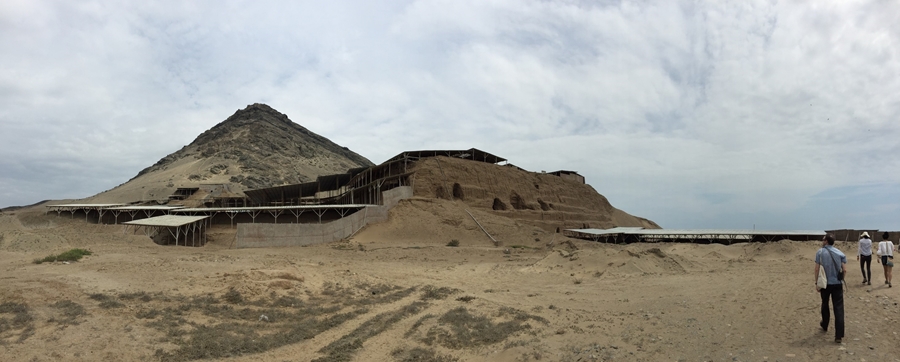
Look back to the future. That’s what we need to do to respond nimbly to climate change, according to archaeologist Ben Vining.
Vining, an assistant professor of anthropology in the Fulbright College of Arts and Sciences, will present a public lecture, “Climate Change: A Human History,” online via Zoom at 5:15 p.m., Monday, Mar. 7.
His lecture will preview his Fall 2022 Honors College Signature Seminar, Climate Change: A Human History. Please fill out this online interest form to gain access to the lecture.
“Most of the discussion we have about climate is forward looking, and is based on projecting models - very good, very robust mathematical models,” Vining said. But those models tend to focus on physical processes.
“We also have humans as a wildcard in responding to those climactic events, and we don’t really have good information to understand how that plays out.” The key to improving those models, he argues, is to study how past peoples responded to climate change.
LEARNING FROM THE PAST
Vining specializes in climate change archaeology, which tracks patterns in how people have responded to changes in rainfall, temperature and drought. There are classic examples, much discussed: the ancient- or Classic-period Maya in southern Mexico and northern Central America, the Indus Valley civilization in South Asia, the Sumerian civilization in the Middle East and the Moche and Chimu societies in Peru, which Vining investigates.
“There is a whole slew of different societies that are the headliners for climate history, and each case is unique,” Vining said. The work is painstaking, based on imperfect evidence.
“Really it’s a lot like forensics,” he emphasized. “We have a bunch of evidence, but we don’t have the actual events laid out in front of us –– we have the remains of those events. And so, we’re trying to make the best, most reliable interpretation that we can.”
Vining is quick to dismiss sensational stories of collapsed civilizations doomed by catastrophic climate change.
“If we look at the long-term arc of human history, we have a generally upward trend with some up and down … We could look at the Maya, we could look at Indus, we could even look at the Vikings. We don’t see the complete total disappearance of a people ever, what we see is transformation of how they’re doing things, how they’re living, where they’re living. And I think those are the lessons that we want to look at carefully.”
ABOUT BEN VINING
Vining has led research on climate change archaeology for 20 years. He has worked in the Andean region of South America since 2001 and currently leads a multidisciplinary project with American and Peruvian collaborators to understand how past climates affected societies in ancient Peru. This project specifically seeks to understand how the Moche and Chimu civilizations adapted to abrupt climate shifts caused by the El Niño Southern Oscillation.
Vining has conducted field research in more than 13 countries in Latin America, the Mediterranean, and East and Southeast Asia.
SIGNATURE SEMINARS EXPLORE DIVERSE TOPICS
Climate Change: A Human History is one of three Honors College Signature Seminars scheduled for Fall 2022. Other topics to be explored include Wrongful Convictions, taught by Tiffany Murphy, associate dean for academic affairs and director of the Criminal Practice Clinic at the U of A School of Law, and Extractions, taught by Toni Jensen, an associate professor in creative writing and indigenous studies.
Deans of each college may nominate professors to participate in this program, and those who are selected to teach will become Dean’s Fellows in the Honors College.
Honors students must apply to participate, and those selected will be designated Dean’s Signature Scholars. The course application is posted online on the Signature Seminars web page. The deadline to apply is Thursday, March 31.
About the Honors College: The University of Arkansas Honors College was established in 2002 and brings together high-achieving undergraduate students and the university’s top professors to share transformative learning experiences. Each year the Honors College awards up to 90 freshman fellowships that provide $72,000 over four years, and more than $1 million in undergraduate research and study abroad grants. The Honors College is nationally recognized for the high caliber of students it admits and graduates. Honors students enjoy small, in-depth classes, and programs are offered in all disciplines, tailored to students’ academic interests, with interdisciplinary collaborations encouraged.
About the University of Arkansas: As Arkansas' flagship institution, the U of A provides an internationally competitive education in more than 200 academic programs. Founded in 1871, the U of A contributes more than $2.2 billion to Arkansas’ economy through the teaching of new knowledge and skills, entrepreneurship and job development, discovery through research and creative activity while also providing training for professional disciplines. The Carnegie Foundation classifies the U of A among the top 3% of U.S. colleges and universities with the highest level of research activity. U.S. News & World Report ranks the U of A among the top public universities in the nation. See how the U of A works to build a better world at Arkansas Research News.
Topics
Contacts
Ben Vining, assistant professor in the Department of Anthropology
Fulbright College of Arts and Sciences
479-575-6633,
Kendall Curlee, director of communications
Honors College
479-575-2024,